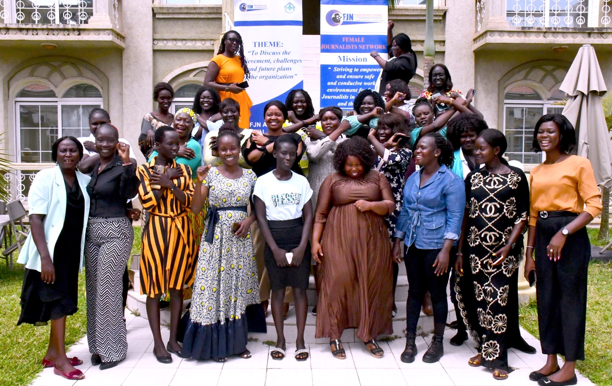At least 30 female journalists drawn from over eight states of South Sudan converged in Juba under the auspices of the Female Journalists Network (FJN) to share their personal stories and the challenges they face in the line of duty.
The female journalists seized the opportunity to share their experiences and some of them spoke out against rigid editors who practice sexism and ageism while assigning roles to reporters in their daily morning editorial meetings.
A female journalist who preferred anonymity said that at her community radio station, female journalists face rampant sexism and ageism during the assignment of roles. She also said they face sexual harassment which has prompted some of her colleagues to abandon the profession.
“We are always assigned to cover soft story ideas. Our editor used a segregating language that women cannot be assigned to cover hard stories. I consider this sexism. Sometimes, they also say I am too young to cover hard stories, this is ageism. Despite my skills and experience, I have been pressed down because of my age and gender,” the 25-year-old female scribe says. “We have been perceived as the weaker gender and cannot be entrusted to cover hard political stories. We have also experienced sexual harassment when assigned to go to the field.”
“It is not fair to look at us as sexual objects and the Female Journalists Network (FJN) should investigate this,” she adds.
Halima Gladys, a female journalist working for Voice of Freedom Radio in Magwi County in Eastern Equatoria State, said some government officials look down upon young female journalists and prefer to be interviewed by male journalists, a matter she says hurts her and impedes her career as a young female journalist.
“Government officials prefer to be interviewed by male journalists. I do not know what the problem is with female journalists. As long as all of us are journalists, women also have a right to interview senior public figures,” Gladys says. “Female journalists should be given access to interview senior government officials. Why not? We are trying to adapt to this situation but we appeal to FJN to intensify its advocacy drive to change the narrative. We need equal rights in the media.”
She appealed to FJN to set up clear plans that will help female journalists cover the anticipated general elections effectively and without hindrance.
In 2019, two female journalists were reportedly physically assaulted by an army officer while covering a news event at the SSPDF General Headquarters in Bilpam, north of Juba City.
The incident attracted wide condemnation from the public and media advocacy organizations triggering an apology from the SSPDF leadership.
The army said in a statement that they regretted the attack on the two female reporters by a senior officer.
Ayen Achol Deng, a female journalist who participated at the event organized by FJN which is supported by the Norwegian People’s Aid (NPA), attributes such inappropriate and brutish behavior by some government officials to the impacts of prolonged civil wars in the country. She says South Sudanese cultures do not encourage violence against women.
Achol also echoes that some media managers abuse their authority by subjecting female employees to sexism, ageism, and other negative gender vices such as sexual harassment that do not promote equal participation in nation-building. She advises women to identify allies to help improve their situation by strengthening policies and rules that disallow hate speech, sexual exploitation, and gender discrimination in society.
“It is very challenging for media practitioners especially women working for radio stations, magazines, and newspapers because sometimes, male editors do not take female journalists seriously. The editors don’t trust that female journalists can go to military barracks to interview army generals,” Achol explains. “We have only very few female journalists who have defied this negative vice. For example, Maura Ajak who sometimes goes to cover hard stories at the army general headquarters. We hope to see change when FJN continues to do gender mainstreaming stories that create awareness.”
“Change takes time but it is imminent,” she adds.
Meanwhile, Aquilina Adhel, a female journalist from Northern Bahr-al-Ghazal State, praised the inhabitants of her home state for respecting female journalists but lambasted politicians for interfering with media rights.
“The people of Northern Bahr el Ghazal State respect female journalists. We have support from our community. Sometimes, when our radio goes off-air, they become concerned because it is the main source of information for them,” she says. “But politicians are trying to interfere with media freedoms. We are being censored by some politicians in the state. They feel unhappy when we play statements of other political leaders who are not from their party. They should understand the essence of the multiparty system which we have now.”
“Media is an independent entity and it should not be disturbed,” Adhel adds.
For her part, Stella Senya Santino, a female journalist plying her trade in Yei River County, said female journalists suffer daily challenges including rigid bosses who could be editors or station managers. She appealed to FJN to address these challenges ahead of the general elections next year.
“Some male station managers and editors do not trust female journalists. Sometimes we have the zeal to take on hard stories but our craving for hard stories has been hindered even by some government officials,” she laments. “They think we are too young to report on hard stories. I am here in Juba to brainstorm solutions to these challenges.”
At the end of the discourse, the chairperson of the Female Journalists Network (FJN), Irene Ayaa Lokang, said that through sharing experiences, the members noted that sexual harassment of female journalists still exists and called for a swift investigation into the claims.
“The members noted that the sexual harassment of female journalists is still a reality both at workplaces and in the field,” she says. “The leadership of FJN strongly condemns these fresh acts of sexual harassment of female journalists by individuals within the media fraternity.”




